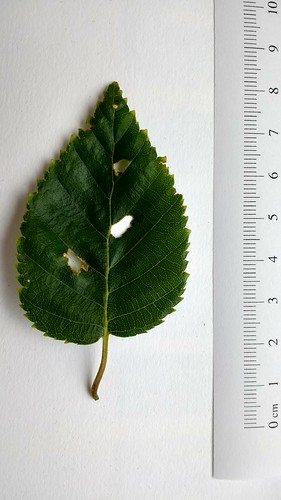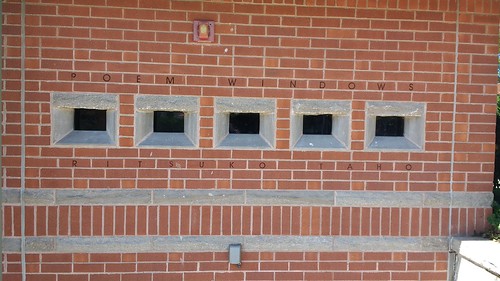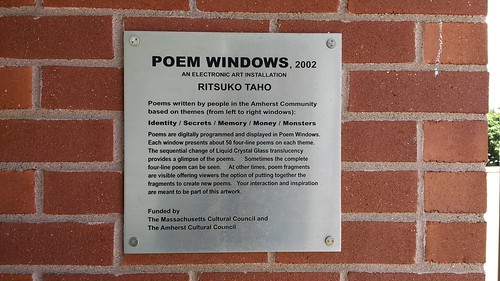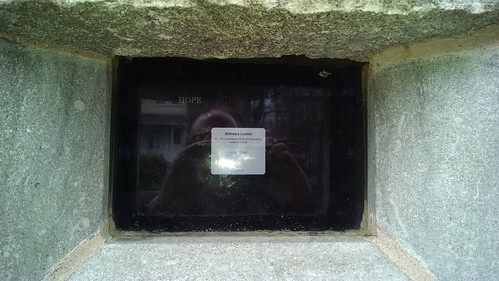I had a wonderful Father's Day today doing precisely what I wanted to all day. Everyone was thoughtful and supportive. It was great.
I had a typical Sunday morning breakfast with Lucy, chatting on-line with Phil and doing the Jumble together. I outlined three goals for the day: visiting the Pollinator Garden (which Philip wittily referred to as the "Pollinatarium"); playing some StarCraft; and walking somewhere to play Ingress. After the Jumble, I asked Phil if he wanted to play SC, but he demurred, saying he had other plans in the morning. So Lucy and I headed to the Pollinator Garden.
The Pollinator Garden is relatively new: they only installed it last year. I see it whenever I drive to Northampton, but it's not on my usual path to UMass, so I haven't visited it very often. Lucy, however, walks that way frequently and has enjoyed it a great deal. Yesterday, she noticed some stinkhorns and recommended I come look at them. They were a bit past their prime, but I was pleased to see them and wrote a haiku for the occasion.
I checked in with Phil after the walk, but he was still occupied so I fixed myself a quick salad for lunch and headed off for phase two: Ingressing. I have been low on "gear"—resonators, mostly—so I decided to head to Northampton where there are a lot of blue portals relatively close together. I invited Alisa to come with me, but she wanted to visit the Taste one last time.
I parked across from the Roost and visited the antique store for a moment. We've bought some things there before, but it's always fun to look over the weird old stuff. There wasn't anything I needed to buy, so I walked toward town. I stopped along the way to place or replace resonators and to hack and link portals.
I stopped at Don Mueller Galleries which is usually out of my price range and cooled off in the air conditioning for a moment. They have interesting artwork—many glass items—and jewelry. There were some framed miniature dioramas that caught my eye and then I saw a necklace that was interesting. It was just a row of small stones, but rough and greenish, captured in gold wire. I asked to have the young woman get it out and I looked at it more closely. It was expensive, but not ruinously so. I thought for a bit. I explained to her that my wife's tastes tend to be diametrically opposed to mine: if I love something, that usually means she'll hate it. But I thought she might like this. And, I continued, it was Father's Day! I could get it for her and it would be her present to me to wear it! She smiled and said that it sounded like a clever idea. "Perhaps too clever," I sighed. I decided to walk on for a bit and think about it.
I went on, stopping at an art supply store to look for little booklets that I want to give students while teaching haiku. And I walked through the stationery store. And then I sat down in Thornes to cool off for a while in the air conditioning, as I was drenched in sweat by this time. It was not particularly hot, but very very humid.
On my way back, when I reached Don Mueller Galleries, I realized I still hadn't decided what to do about the necklace. I leaned up against a tree and thought about it a bit more. But then I decided to get it. We don't generally do presents so giving something on Father's Day seemed perfect. The young lady put it into a box for me and wrapped it up with a fancy ribbon. There was a nice bounce in my step all the way back the car.
When I got home, Phil was still out, but headed home. I called my dad to wish him a happy father's day. I had spoken with him for his birthday the day before—and had wished him an early happy father's day then too—but it was nice to catch up on the day. Once Phil returned we logged into StarCraft Broodwar and played a couple of games. I paused only for a moment when Alisa and Daniel came home so I could give her the necklace. It was fun to watch her open it and see her reaction—which was better than I might have expected. She promptly posted a picture in Facebook with a thoughtful message so I could get all the brownie points of her friends appreciating it online. But her post is private, so I can't share it here.
After StarCraft, I decided to make some curry. I sauteed an onion, cut up some potatoes, carrots, and added some diced tomatoes. Once they were cooked, I threw in some cauliflower and then added hot curry paste. A nice vegan curry that's good with fresh cilantro and brown rice. I also opened a jar of Amba Haldar I've had for a while. Salty.
Alisa had taken Daniel to work and then was out for a bit, so I had dinner with Lucy. When I heard the door open, I welcomed Alisa home. She said, "Don't you ever answer your phone?" I looked and saw that Charlie had called! But then Charlie was there! He had a day off! We hadn't heard from him since he headed to camp, so it was nice to catch up with him and to get to see both my boys on Father's Day. It was a perfect day.
Thanks to everyone who made my day so special!











